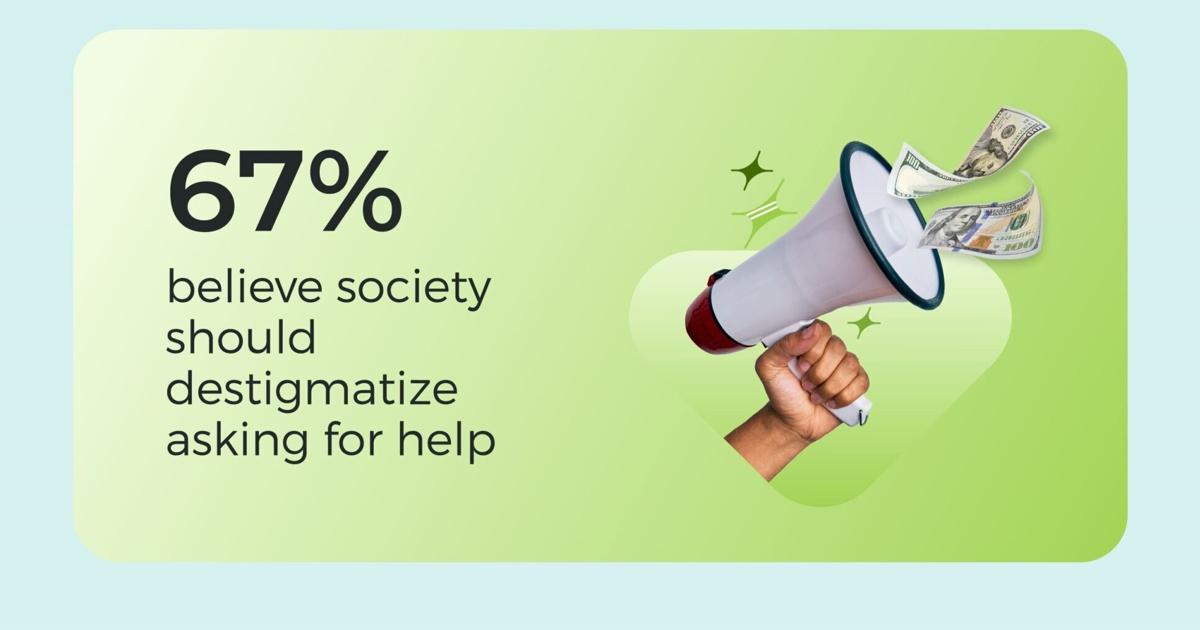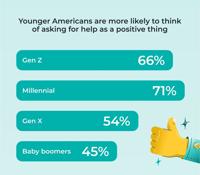(Photo by Tima Miroshnichenko via Pexels)
“Help” isn’t a dirty word: a new study has found younger generations are less likely to think asking for help is a bad thing.
The poll of 2,000 U.S. adults, split evenly between Gen Z, millennial, Gen X and baby boomer generations found the two younger generations saw asking for help as a positive thing (71% for millennials, 66% for Gen Zers) more than Gen Xers and baby boomers (54% and 45%, respectively).
Likewise, both a majority of Gen Zers (57%) and millennials (60%) believe they’re better about asking for help or support when it’s needed than their predecessors.
If they were actually put in a challenging position where they had to decide to ask for help or manage it on their own, a quarter of all Americans (26%) said they’d prefer asking for help.
Commissioned by Upstart and conducted by Talker Research, the research found 67% of Americans — regardless of generation — believe society should destigmatize asking for help or support, financial or otherwise. Many even shared how they believe asking for support can be destigmatized:
According to one respondent, “It’s okay to need something to lean on. It doesn’t emasculate a man and it doesn’t make a woman look like a damsel in distress.”
“I think for that to happen, we need to emphasize community, as a whole, more,” said another. “Society is very individualist as of now, but there are ways to improve community.”
Though the perception of support is changing for the better, 53% of Americans admitted they don’t like asking for help or support out of fear of being judged. Surprisingly, while Gen Z are more likely to ask for support, they’re also the most likely to feel a fear of being judged for doing so (64%).
Sasun Bughdaryan
And when they need support, people are most likely to turn to their friends (39%), partner (36%), their mom (24%) and extended family members (23%).
“It’s natural for people to feel this internal struggle when it comes to asking for help, but this survey shows that the stigma is slowly fading away,” said Erin Opperman, Vice President of Creative at Upstart. “No one should feel like they’re being judged simply because they could use a little extra support. Having systems in place to help people progress is how we grow together as a society.”
The study also found that, for many Americans, support specifically for their financial wellbeing would be a huge help.
Regardless of generation, everyone feels the weight of financial stress: Nearly nine in 10 (87%) said they feel some level of stress as it relates to their financial situation. Forty percent said they’re “extremely” or “significantly” stressed by their finances. This was highest amongst Gen Xers, 46% of whom felt large amounts of finance-related stress.
The biggest contributors to their stress comes from living paycheck-to-paycheck (41%), unexpected costs (23%), high-interest debt (13%) and not having any financial support (12%).
(Talker Research)
In fact, 72% of Americans believe if they had financial support, it would have a major positive impact on their mental wellbeing — especially amongst millennials (77%) and Gen Xers (75%) alike.
Four in five (81%) believe their financial institutions should offer more financial support, and 48% claimed they felt misunderstood by their banks.
Many of them believe their financial institutions don’t consider the financial stress they feel (40%), only see them for their credit score (30%), aren’t helpful (30%) or only see them for how much money is in their bank account (26%).
Two-thirds believe they would have more confidence in making wiser future financial decisions if they had better support from their financial institution.
“Getting the right financial support is a major unlock for most Americans,” said Chantal Rapport, Chief Marketing Officer at Upstart. “So much of our lives are tied to our financial situations, so when people are understood and supported by trustworthy financial partners, they can focus on what matters and go on to do great things in their lives and their communities.”
(Photo by Karola G via Pexels)
Survey methodology:
Talker Research surveyed 2,000 American adults, split evenly by generation (Gen Z, millennial, Gen X, baby boomer); the survey was commissioned by Upstart and administered and conducted online by Talker Research between Sept. 30 and Oct. 6, 2025.
We are sourcing from a non-probability frame and the two main sources we use are:
- Traditional online access panels — where respondents opt-in to take part in online market research for an incentive
- Programmatic — where respondents are online and are given the option to take part in a survey to receive a virtual incentive usually related to the online activity they are engaging in
Those who did not fit the specified sample were terminated from the survey. As the survey is fielded, dynamic online sampling is used, adjusting targeting to achieve the quotas specified as part of the sampling plan.
Regardless of which sources a respondent came from, they were directed to an Online Survey, where the survey was conducted in English; a link to the questionnaire can be shared upon request. Respondents were awarded points for completing the survey. These points have a small cash-equivalent monetary value.
Cells are only reported on for analysis if they have a minimum of 80 respondents, and statistical significance is calculated at the 95% level. Data is not weighted, but quotas and other parameters are put in place to reach the desired sample.
Interviews are excluded from the final analysis if they failed quality-checking measures. This includes:
- Speeders: Respondents who complete the survey in a time that is quicker than one-third of the median length of interview are disqualified as speeders
- Open ends: All verbatim responses (full open-ended questions as well as other please specify options) are checked for inappropriate or irrelevant text
- Bots: Captcha is enabled on surveys, which allows the research team to identify and disqualify bots
- Duplicates: Survey software has “deduping” based on digital fingerprinting, which ensures nobody is allowed to take the survey more than once
It is worth noting that this survey was only available to individuals with internet access, and the results may not be generalizable to those without internet access.






